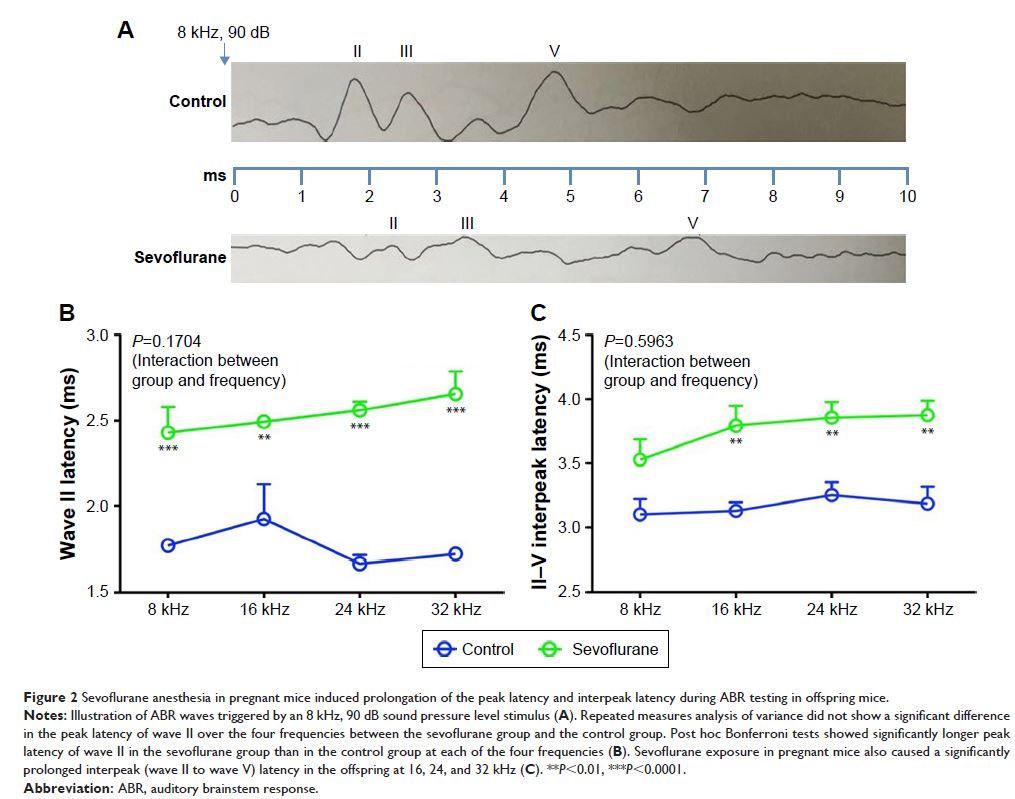108605
论文已发表
注册即可获取德孚的最新动态
IF 收录期刊
- 3.4 Breast Cancer (Dove Med Press)
- 3.2 Clin Epidemiol
- 2.6 Cancer Manag Res
- 2.9 Infect Drug Resist
- 3.7 Clin Interv Aging
- 5.1 Drug Des Dev Ther
- 3.1 Int J Chronic Obstr
- 6.6 Int J Nanomed
- 2.6 Int J Women's Health
- 2.9 Neuropsych Dis Treat
- 2.8 OncoTargets Ther
- 2.0 Patient Prefer Adher
- 2.2 Ther Clin Risk Manag
- 2.5 J Pain Res
- 3.0 Diabet Metab Synd Ob
- 3.2 Psychol Res Behav Ma
- 3.4 Nat Sci Sleep
- 1.8 Pharmgenomics Pers Med
- 2.0 Risk Manag Healthc Policy
- 4.1 J Inflamm Res
- 2.0 Int J Gen Med
- 3.4 J Hepatocell Carcinoma
- 3.0 J Asthma Allergy
- 2.2 Clin Cosmet Investig Dermatol
- 2.4 J Multidiscip Healthc

小鼠怀孕期间接受七氟醚麻醉可诱导了后代的听力损伤
Authors Shen X, Xiao Y, Li W, Chen K, Yu H
Received 4 November 2017
Accepted for publication 17 April 2018
Published 22 June 2018 Volume 2018:12 Pages 1827—1836
DOI https://doi.org/10.2147/DDDT.S156040
Checked for plagiarism Yes
Review by Single-blind
Peer reviewers approved by Dr Palas Chanda
Peer reviewer comments 2
Editor who approved publication: Dr Georgios Panos
Introduction: Exposure to
gamma-aminobutyric acid-mimetics and N-methyl-d-aspartate-receptor antagonists
during pregnancy may lead to hearing loss and long-term behavioral
abnormalities in the offspring. The purpose of this study was to explore the
association between prenatal exposure to sevoflurane (SEV) anesthesia and
hearing impairment in mice.
Materials and methods: On gestational day 15, pregnant Kunming mice were
exposed for 2 hours to 2.5% SEV plus 100% oxygen (anesthesia group) or 100%
oxygen alone (control group).
Results: During auditory brainstem response testing on
P30, offspring of the anesthesia group mice exhibited higher hearing thresholds
at 8, 16, 24, and 32 kHz; longer peak latency of wave II at all four
frequencies; and longer interpeak latencies from waves II to V at 16, 24, and
32 kHz, compared to the control offspring. Caspase-3, iNOS, and COX-2
activation occurred in the fetal cochlea of the anesthesia group. Mitochondrial
swelling was observed in the anesthesia group offspring at P1 and P15.
Conclusion: Our
results suggest that SEV exposure during pregnancy may cause detrimental
effects on the developing auditory system.
Keywords: sevoflurane,
auditory brainstem response, apoptosis, cochlea, pregnant mice
